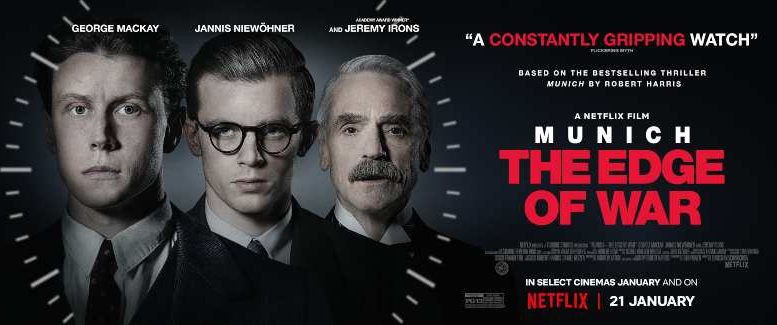This week I wasted two hours of my life on a terrible new film called “Munich: The Edge of War.” It is based on a best-selling novel by Robert Harris.
Now the problem with Robert Harris’ novels is that they are often not very good. I know this because I have read most of them. He usually starts with an intriguing idea and then goes off to have a nap. Or something. The books are disappointing. One of the silliest revolved around the revelation that Soviet dictator Josef Stalin secretly had … a child! But of course Stalin had several children, none of whom featured in this story. A minor point.
Harris’ novel ‘Munich’ tells the story of two young men, one German and one English, who were friends at Oxford. In 1938, they team up to prevent the outbreak of the Second World War by stopping Chamberlain from signing an accord with Hitler. (Spoiler alert: they failed; the Second World War did happen.)
The story of Chamberlain’s doomed attempt to reach a peace agreement with the Nazi dictator is well known. It remains widely criticised to this day not only for the British prime minister’s naïveté, but also for the fact that the fate of Czechoslovakia was being decided at a conference at which the Czechoslovaks were not present. They were not invited. Chamberlain has become the poster boy for disastrous polices — of which appeasement was one — and his example was cited by a former Tory minister last week who was angry at Boris Johnson.
The problem with the Netflix film was not only that the plot was idiotic, and the acting wooden (except for consistently good performance by Jeremy Irons), but the timing.
Because this film premiered during the week that the Americans and Russians were meeting in Geneva to discuss the future of Ukraine. With no Ukrainians anywhere in sight.
The fate of Ukraine, like the fate of Czechoslovakia eight decades ago, was being decided by others. And not only Ukraine: Putin is demanding that countries like Georgia be blocked from Nato membership, and that actual Nato members like Bulgaria and Romania lose any protection that the alliance may have given them. Poland, the Baltic states and others are watching Putin’s next moves with understandable concern.
The film ends, as you would expect, with a title card summing up what happened next. I imagined that it would mention that the gift of Czechoslovakia did not suppress Hitler’s appetite for aggression, leading eventually to the catastrophe of another world war. That didn’t happen. Instead, the producers decided to put this on our screens, summing things up:
“The extra time brought by the Munich agreement enabled Britain and her allies to prepare for war and ultimately led to Germany’s defeat.”
In other words, appeasement was part of the process that led to victory. Well done, Mr. Chamberlain.
In reality, the “extra time” gave all sides, not just the good guys, time to prepare for war. The Nazis prepared rather better than the rest.
Last week I watched the American and Russia diplomats convening in Geneva’s Hotel President Wilson to decide the future not only of Ukraine, but of all the countries Vladimir Putin believes belong under Russian domination.
I was not alone in thinking about the Munich conference of 1938 and its real results — and not the dangerous and dishonest message of this film.
This article appears in the current issue of Solidarity.
